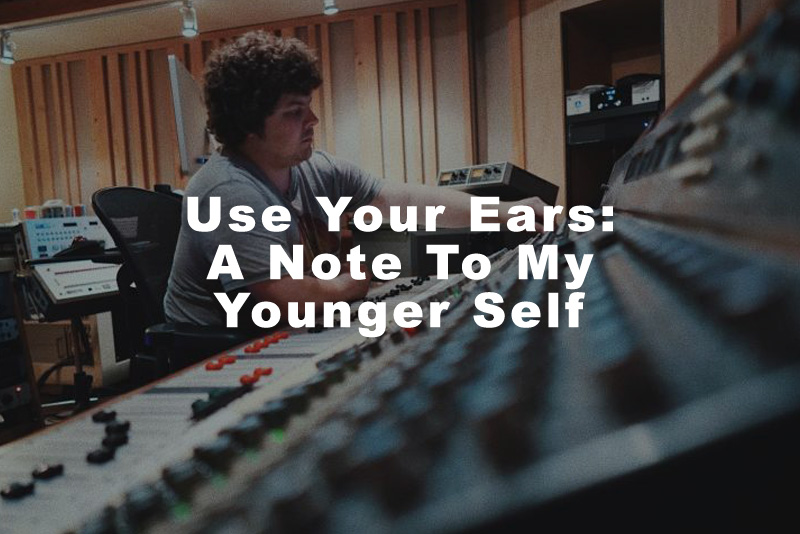Use Your Ears: A Note To My Younger Self
This is a guest post by Brian Dane Hansen.
There was a point in my career where the projects that I was currently mixing sounded worse than the songs that I first mixed when I was just getting started.
When I realized this, I was kind of crushed. What the heck? Why did this happen? I had spent a ridiculous amount of time reading articles and watching YouTube videos about how to better eq drums and compress vocals. I had read all Gearslutz forums on the best mix gear and which set of studio monitors were the best. Name a YouTube music production educational video and I had watched it. I had done my homework. Learned as much as I could learn.
Technically, my new mixes were louder, they had a proper mix bus on them, I was using parallel compression AND I even used tape emulation plugins! I mean, The Beatles’ used tape right? So, come on! Why don’t my mixes sound better than my old ones?
The problem was that I wasn’t using my ears.
I was leaning too hard into my technical know-how. I’m sure I had watched a video that said if you want your snare drum to be beefier, then you needed to boost 110 hz on your 1073 plugin. So, every time I wanted a thicker, punchier snare I was only boosting 110 hz with my 1073 plugin. But I was just regurgitating technical information and not using my ears to help tell me what eq treatment that specific snare drum needed. Now sometimes boosting 110 hz does work for a snare drum and that’s great, BUT I’ve learned not to treat that as a hard and fast rule. I’ve learned to use my ears.
Now a quick disclaimer. There are a ton of incredible YouTube channels and websites out there creating excellent educational content to sharpen your recording and mixing skills. I don’t want to throw shade on any of the YouTubers out there. I continuously watch tons of videos to constantly be learning how and why other mixers are getting great sounds. Here are just a few of my favorite channels that I currently subscribe to:
- Mix With The Masters
- PureMix
- Pensado’s Place
- Making Records With Eric Valentine
- Produce Like A Pro).
But always keep in mind that the why is more important than the how. Learning the reason behind why a piece of gear or plugin was the best one for the job or why the bass was eq’d the way it was is what is of value to you. Almost all the channels I mentioned teach that way. They teach the why, not a do this for instant success method, which, just a heads up, doesn’t exist. It is vital to learn the why so that when you sit down in front of your speakers or put your headphones on you can wisely listen to select that right tool for the job or make the right EQ or compression move.
We are all in the business of making cool, unique and excellent sounding records and we benefit from being able to learn from each other through YouTube and tons of other sites. But what works for one person, whether mixing Coldplay in a big commercial studio, or producing Billie Eilish in a bedroom, isn’t always going to work for you. So use your ears. The track you’re currently working on isn’t the song that they were eq-ing so why would you do exactly what they did? I’m gonna sound like a broken record here but… use your ears. Do what’s right for the song not what worked for someone else’s song.
I know for a fact that I heard ‘use your ears’ when I was getting started and I always thought that was such a ‘no duh’ type of statement. And to some degree it is, but at this day and age, it’s so easy to depend on gear and technical know-how, and forget the basics. When you sit down to mix, actively listen. Ask yourself, what does the artist want to hear at this moment of the song? What are my ears telling me about how to get it to the point where the artist wants it? Serve the song by using your ears. Even if what is working for you on this song is the opposite of what worked for that guy or girl in the YouTube video you watched, then do it!
I say all of this to encourage you and to hopefully help you avoid what tripped me up when I was first starting out. I got caught up in the technical info AND treating what one person said as a hard and fast rule for every song. So don’t do that, ok? Good. Now go out there and make great mixes.

